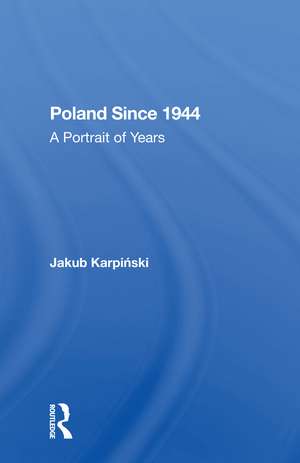Poland Since 1944: A Portrait Of Years
Autor Jakub Karpinskien Limba Engleză Paperback – 4 dec 2020
Toate formatele și edițiile
| Toate formatele și edițiile | Preț | Express |
|---|---|---|
| Paperback (1) | 259.98 lei 6-8 săpt. | |
| Taylor & Francis – 4 dec 2020 | 259.98 lei 6-8 săpt. | |
| Hardback (1) | 769.90 lei 6-8 săpt. | |
| Taylor & Francis – 4 iun 2019 | 769.90 lei 6-8 săpt. |
Preț: 259.98 lei
Preț vechi: 311.41 lei
-17% Nou
Puncte Express: 390
Preț estimativ în valută:
49.75€ • 52.08$ • 41.16£
49.75€ • 52.08$ • 41.16£
Carte tipărită la comandă
Livrare economică 07-21 aprilie
Preluare comenzi: 021 569.72.76
Specificații
ISBN-13: 9780367298586
ISBN-10: 0367298589
Pagini: 314
Dimensiuni: 152 x 229 mm
Greutate: 0.45 kg
Ediția:1
Editura: Taylor & Francis
Colecția Routledge
Locul publicării:Oxford, United Kingdom
ISBN-10: 0367298589
Pagini: 314
Dimensiuni: 152 x 229 mm
Greutate: 0.45 kg
Ediția:1
Editura: Taylor & Francis
Colecția Routledge
Locul publicării:Oxford, United Kingdom
Cuprins
Preface -- 1944 The Coming of the Red Army, New Authorities -- 1945 The Red Army Offensive, Yalta Conference, Trial of 16 Leaders of the Polish Resistance Movement, Potsdam Conference -- 1946 Referendum -- 1947 First Elections, Operation Vistula, Cominform -- 1948 Deviation in the Polish Worker Party, New Name for the Party -- 1949 Rokossovsky in Poland -- 1950 Agreement Between Church and State, the War in Korea, New Banknotes -- 1951 Trials of Generals and Underground Activists -- 1952 Bierut and the Constitution, the Birth of the Polish People’s Republic -- 1953 Stalin's Death, Arrest of the Primate -- 1954 Światło's Broadcasts, Organizational Shifts -- 1955 The Party on the Rule of Law, Warsaw Pact, Youth Festival -- 1956 Polish United Workers Party and the Soviet Union, Bread and Freedom -- 1957 Elections Without Selection, the Weekly Po prostu Closed -- 1958 Transformation of Self-Management, Police in Jasna Góra Monastery -- 1959 Temporary Difficulties, Meatless Days -- 1960 Victory over the Teutonic Knights -- 1961 Unification of the Educational System -- 1962 Supervised Meetings -- 1963 The Ideological Front -- 1964 Against Threats to Culture -- 1965 Bishops and Germans -- 1966 Millennium -- 1967 People's Poland as the Only Mother Country -- 1968 Mickiewicz, Students, and Zionists -- 1969 The Penal Law, "Normalization in Czechoslovakia" -- 1970 Agreements with the German Federal Republic, Shootings in the Polish Coastal Area -- 1971 New Strikes, "Will You Help Us?" -- 1972 Ratification of Agreements with the German Federal Republic, Ordering of the Nomenklatura -- 1973 Socialist Youth Unions -- 1974 The Thirtieth Anniversary, Brezhnev's Visit -- 1975 A New Administrative Division of the Country, The Helsinki Declaration -- 1976 A Guiding Force, Friendship with the Soviet Union, Workers -- 1977 Reluctant Tolerance of Independence and Opposition -- 1978 Free Trade Unions, Karol Wojtyła Elected Pope -- 1979 John Paul II in Poland -- 1980 Solidarity -- 1981 Nearly One Year of Freedom, the December Blow -- 1982 The Underground, Demonstrations, the Outlawing of Solidarity -- 1983 Martial Law Repealed, Next Time a State of Emergency -- 1984 The Police and the Killing of a Priest -- 1985 Elections and Travels Abroad -- 1986 The Release of Prisoners, Tentative Openness -- 1987 Consultations and a Referendum -- 1988 Two Strike Waves and Talks -- 1989 Round Table Conference, Joint Government -- 1990 "War at the Top," Wałęsa Elected President -- 1991 Elections, Financial Scandals, the Diet -- 1992 Toward a Presidential System -- 1993 The Left's Victory
Notă biografică
Jakub Karpiński is director of the Polish Policy Institute, an independent research and educational institution based in Warsaw and is a member of the Board of Directors of the Institute of Democracy in Eastern Europe.
Descriere
This invaluable reference work provides a balanced and comprehensive year-by-year treatment of cumulatively powerful events in contemporary Polish history. Poland Since 1944 creates a unique portrait of life in a central European country under communism and during the recent demise of the system.
